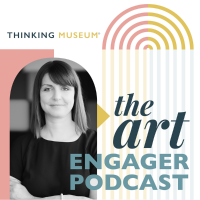Episode 56
Learning to Love 'Boring' Objects through Slow Looking
In today’s solo episode, I’m talking about how we can use slow looking to learn to love objects that you might find 'boring' or uninspiring.
We can’t possibly love everything in a museum’s collection. There are always going to be some objects or artworks that we are drawn to for some reason. Equally there will also be objects or artworks that leave us cold.
Equally, every museum or art gallery has its superstar or highlight objects. These are the objects or artworks that get far more attention than others. They are usually well positioned, even spotlighted and quite often have a space all to themselves.
So, as much as this episode is about how we as educators, guides and docents can learn to love so-called ‘boring’ objects, it’s also about how we can get our visitors to love objects that are less well known too.
Today I’m sharing examples of two objects that only came to life for me once I had spent time with them. I hope the examples will provide some inspiration for you to search out the ‘boring’ and ‘mundane’ objects in your organisations, and to fully embrace them.
Spending some time slow looking with objects that you’re not immediately excited by will, I promise, transform the way you see them.
At the end, I’m sharing the key takeaways from these two examples and how they can teach us to love boring objects.
Links
Join the SLOW LOOKING CLUB Community on Facebook
Find me on Instagram, Facebook, Twitter and LinkedIn
Sign up for my weekly dose of carefully-curated inspiration The TM Weekly
Vintage Dutch Bean Slicer (Snijbonenmolen)
The Great Pustaha Google Arts and Culture
Episode 2 What is Slow Looking (and How Can I Get Started?)
Episode 41 - 12 reasons to get started with slow looking


